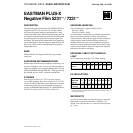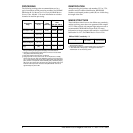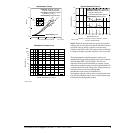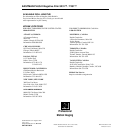
2 EASTMAN PLUS-X Negative Film 5231™ / 7231™ • H-1-5231
PROCESSING
The following starting-point recommendations are for a
typical continuous-strand processing machine. See KODAK
Publication H-24, Manual for Processing KODAK Motion
Picture Films, Module 1, for more information on solution
formulas for machine processing.
Processing
Step
Temperature
˚C (˚F)
Time
(min:sec)
Replenishment
Rate
(mL per 100 ft)
35 mm 16 mm
KODAK
Developer D-96*
* Agitation in the developer and fixing bath should be by recirculation
through submerged spray jets that impinge on the film strands.
21 ± 0.3
(70 ± 0.5)
Approx
5:00†
† Develop to recommended control gamma of 0.65 to 0.70 calculated
using Status M densitometry (blue).
1,250
(D-96R)
625
(D-96R)
Stop Rinse‡
‡ Fixer-laden water from wash tank, pH about 6.
21 ± 1
(70 ± 2)
0:50 12,000 6,000
KODAK
Fixing Bath F-5*
21 ± 1
(70 ± 2)
6:00 850 425
Countercurrent
Wash (3 stages)
21 ± 1
(70 ± 2)
10:00 12,000 6,000
Dry§
§ Drying depends on many factors such as air temperature, humidity,
volume and rate of air flow, flow distribution pattern, final squeegeeing,
etc. In a typical motion-picture film drying cabinet with air at about 35˚C
(95˚F) and 40- to 50-percent relative humidity (RH), satisfactory drying
will require 15 to 20 minutes. Film leaving the drying cabinet when it has
reached room temperature should be at equilibrium with room air at
approximately 50-percent RH.
35
(95)
———
IDENTIFICATION
After processing, the product code numbers 5231 or 7231,
emulsion and roll number identification, KEYKODE
Numbers, and internal product symbol (H) are visible along
the length of the film.
IMAGE STRUCTURE
The modulation-transfer curves, the diffuse rms granularity,
and the resolving power data were generated from samples
of 5231 Film exposed with tungsten light and processed as
recommended in KODAK Developer D-96. For more
information on image-structure characteristics, see KODAK
Publication No. H-1, EASTMAN Motion Picture Film.
Diffuse RMS Granularity* 10
* Read at a net diffuse visual density of 1.0, using a
48-micrometer aperture.
Resolving Power†
† Determined according to a method similar to the one described
in ISO 6328-1982,
Photography—Photographic Materials—
Determination of ISO Resolving Power.
TOC 1.6:1
TOC 1000:1
32 lines/mm
100 lines/mm






